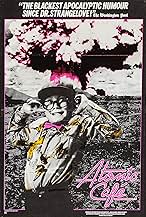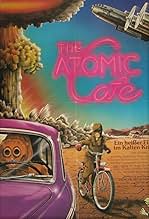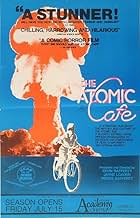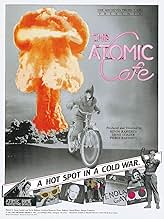VALUTAZIONE IMDb
7,6/10
4735
LA TUA VALUTAZIONE
Aggiungi una trama nella tua linguaDisturbing collection of 1940s and 1950s United States government-issued propaganda films designed to reassure Americans that the atomic bomb was not a threat to their safety.Disturbing collection of 1940s and 1950s United States government-issued propaganda films designed to reassure Americans that the atomic bomb was not a threat to their safety.Disturbing collection of 1940s and 1950s United States government-issued propaganda films designed to reassure Americans that the atomic bomb was not a threat to their safety.
- Nominato ai 1 BAFTA Award
- 2 vittorie e 1 candidatura in totale
Paul Tibbets
- Self
- (filmato d'archivio)
Harry S. Truman
- Self
- (filmato d'archivio)
- (as President Harry S Truman)
W.H.P. Blandy
- Self - Commander of the Bikini Test
- (filmato d'archivio)
- (as Vice Admiral W.H.P. Blandy)
Brien McMahon
- Self
- (filmato d'archivio)
- (as Sen. Brian McMahon)
Lloyd Bentsen
- Self
- (filmato d'archivio)
- (as Rep. Lloyd Bentsen)
Owen Brewster
- Self
- (filmato d'archivio)
- (as Sen. Owen Brewster)
Julius Rosenberg
- Self
- (filmato d'archivio)
Ethel Rosenberg
- Self
- (filmato d'archivio)
Val Peterson
- Self - Director of Civil Defense
- (filmato d'archivio)
- (as Gov. Val Peterson)
Lyndon B. Johnson
- Self
- (filmato d'archivio)
- (as Sen. Lyndon B. Johnson)
Lewis Strauss
- Self - Chairman, Atomic Energy Commission
- (filmato d'archivio)
- (as Lewis L. Strauss)
George Molan
- Self
- (filmato d'archivio)
- (as Cpl. George Molan)
George Portell
- Self
- (filmato d'archivio)
- (as Tech Sgt. George Portell)
Jerry Schneider
- Self
- (filmato d'archivio)
Sergeant Weaver
- Self
- (filmato d'archivio)
Seymour Melman
- Self - Columbia University
- (filmato d'archivio)
- (as Prof. Seymour Melman)
Mario Salvadori
- Self - Columbia University
- (filmato d'archivio)
- (as Prof. Mario Salvadori)
Nikita Khrushchev
- Self
- (filmato d'archivio)
Recensioni in evidenza
The fact that this is true makes this short film scary and worrying...but doesn't stop it from being very entertaining and funny. The pieces of real life propaganda are amazing and it's often hard to believe that it's all true.
However remember that all of the snipets of film are cut and pasted together with music added over the top, so everything you see isn't exactly as it seems... it's propaganda on propaganda...and highly entertaining. A must see for any one interested in American History, Propaganda, or just wanting a good sorry laugh.
However remember that all of the snipets of film are cut and pasted together with music added over the top, so everything you see isn't exactly as it seems... it's propaganda on propaganda...and highly entertaining. A must see for any one interested in American History, Propaganda, or just wanting a good sorry laugh.
An ostensibly tongue in cheek documentary about the nuclear age of the late 40's and 50's, juxtaposing the horrific realities of the arms race with cheery misinformation(and simplistic redbaiting) doled out to the public by the US government and private sector. The overall effect is chilling-for every scene of hilariously misguided propaganda and dismissal of nuclear danger(an army film cheerfully assures a fictional fallout victim that his hair will grow back in no time) there's scenes of Pacific islanders affected by fallout from remote nuclear tests and US soldiers getting debriefed on the minimal dangers of witnessing a nuclear detonation a few miles away(with goggles on, to be fair). Not an objective documentary by any means - not that it should be - the filmmakers excoriate the duplicity of the government and the mock the complacency of the public with equal zeal, but there's a certain absurdist charm to the whole affair.
THE ATOMIC CAFE is one of those few rare documentaries that doesn't have a narrator or a framing figure . All it consists of are clips in a chronological order of the history of the atomic bomb and of the early stages of the geo-political situation of what became known as " The Cold War " which was the direct result of the bomb . There's two ways of looking at this . One is the subject matter is a little bit dry and absurd and the second point of view of view is that the audience are allowed to make up there own mind and it's somewhat refreshing to see a documentary that doesn't involve someone bludgeoning the audience over the head while sticking their opinions down their throat in a painfully smug and snide manner . You can tell this wasn't made by Michael Moore
One wonders what life was like in a pre-nuclear age ? I remember the cold war in the 1980s and the paranoia of that era was chilling , so much so that for people of my generation still refer to the 1984 BBC docu-drama THREADS as the most terrifying thing they have ever seen . That said it could also be argued that if it wasn't for the bomb then a conventional war that would have surpassed the death toll of the second world war might have broken out between 1945 and the collapse of the Soviet Union in 1991 . Reagen in The White House and Brezhnev in the Kremlin ? Not really a recipe for peace and the fact that nuclear weapons are so terrible to contemplate probably focused the minds of world leaders
Being an American documentary all the clips are from an American point of view with an exception of a clip that's almost certainly from an early edition of PANORAMA from the BBC . This is a pity because I would liked to have seen what sort of propaganda if any the USSR was producing at the same time . That said the old cliché of " Americans don't understand irony " is evident as someone praises the virtues of American freedom " because we have shopping malls that are full of food and clothes and most families can afford cars " . I think someone is confusing system of government with economics .As I write this in 2014 China has shopping malls full of food and clothes and the Chinese people can afford to drive cars . The difference is there's no democratic system of government in China so democracy and capitalism are not the one and the same thing , but I guess that clip is to illustrate the inherent absurdity of propaganda ? Likewise we get clips of real life footage of American servicemen being used to test the effects of being caught in an atomic blast " There's nothing to worry about " and of relaxing should your city be caught up in a nuclear war . Did someone say " Absurd ? "
One very interesting point that is often talked about by the CND mob is in relation to the bombing of Hiroshima and Nagasaki as in " Why didn't the Americans drop the bombs in a remote unpopulated area of Japan to force their surrender ? " I've often thought that myself and am unable to give a counter argument to that question . Here we see an interview with Paul Tibbets the pilot who dropped the bomb on Hiroshima who goes in to some detail - it's because these cities were untouched by arial bombing and the American government wanted to study the effects on a bombed city after the war had ended . Some people might think this is amoral or cruelly cynical but you can make up your own mind as to morality during wartime and THE ATOMIC CAFE does allow the audience to think for themselves no matter what the opinions of this documentary's producers are . In that respect it's very refreshing
One wonders what life was like in a pre-nuclear age ? I remember the cold war in the 1980s and the paranoia of that era was chilling , so much so that for people of my generation still refer to the 1984 BBC docu-drama THREADS as the most terrifying thing they have ever seen . That said it could also be argued that if it wasn't for the bomb then a conventional war that would have surpassed the death toll of the second world war might have broken out between 1945 and the collapse of the Soviet Union in 1991 . Reagen in The White House and Brezhnev in the Kremlin ? Not really a recipe for peace and the fact that nuclear weapons are so terrible to contemplate probably focused the minds of world leaders
Being an American documentary all the clips are from an American point of view with an exception of a clip that's almost certainly from an early edition of PANORAMA from the BBC . This is a pity because I would liked to have seen what sort of propaganda if any the USSR was producing at the same time . That said the old cliché of " Americans don't understand irony " is evident as someone praises the virtues of American freedom " because we have shopping malls that are full of food and clothes and most families can afford cars " . I think someone is confusing system of government with economics .As I write this in 2014 China has shopping malls full of food and clothes and the Chinese people can afford to drive cars . The difference is there's no democratic system of government in China so democracy and capitalism are not the one and the same thing , but I guess that clip is to illustrate the inherent absurdity of propaganda ? Likewise we get clips of real life footage of American servicemen being used to test the effects of being caught in an atomic blast " There's nothing to worry about " and of relaxing should your city be caught up in a nuclear war . Did someone say " Absurd ? "
One very interesting point that is often talked about by the CND mob is in relation to the bombing of Hiroshima and Nagasaki as in " Why didn't the Americans drop the bombs in a remote unpopulated area of Japan to force their surrender ? " I've often thought that myself and am unable to give a counter argument to that question . Here we see an interview with Paul Tibbets the pilot who dropped the bomb on Hiroshima who goes in to some detail - it's because these cities were untouched by arial bombing and the American government wanted to study the effects on a bombed city after the war had ended . Some people might think this is amoral or cruelly cynical but you can make up your own mind as to morality during wartime and THE ATOMIC CAFE does allow the audience to think for themselves no matter what the opinions of this documentary's producers are . In that respect it's very refreshing
Watching Atomic Café is like witnessing history repeating, since the scenes are a compilation of bits and pieces from pre-existing films taken from government and education films from the '40s and '50s. As a compilation film, Atomic Café has resulted in a totally new film that is much richer and more meaningful than the sum of its parts.
Atomic Café, will be more understandable if we are familiar with the roots of its historical material. As a history film, Atomic Café takes us to experience three levels of time. The first is the internal time, the Cold War, communism versus the free world, when propaganda about the atomic bomb was made to persuade the people that only nuclear weapons would protect them from the "Evil Empire". The period of the'Nuclear Free' movement comes next. And thirdly, the present time, when the world is changed but has to face the same irony that still is just as relevant today, the fear of weapons of mass destruction.
In the beginning, the film appears to be a straightforward history of America's development and use of atomic weapons. Historical footage is used to add credibility to the information presented. The power of the bomb is demonstrated by showing dramatic footage of the Trinity test; interviews with Bikini Islanders, and preserved eyewitness congressional testimony of atomic bomb veterans. The impact of the weapon is documented through footage of the bomb victims. The intention is not to make us become objective about certain issues, rather it 'is designed to make us question the nature of the information presented' (Freeman Reading Packet, 108).
The film uses unique techniques. It is like a collage that 'sacrifices the conventions of continuity editing and the sense of a very specific location in time and place that follows from it to explore associations and patterns that involve temporal rhythms and spatial juxtaposition' (Nichols, 102). It is all about editing raw material and splicing segments? of military training films, civil defense films, archive footage, interviews, newsreel material, and fifties music. Many sequences are edited to show the most ridiculous side of the duck-and-cover drills and how naïve the Americans were at that time. To make it more derisive the film shows how the military training films were so amateurishly acted and misleading, such as the scene about the beauty of the H-bomb. I believe that the filmmakers have made their point in choosing all the footage for the film. Perhaps the intention is to challenge and deprive the intended message of the original footage.
If we take a look in more detail, Atomic Café chooses and juxtaposes its various elements to support its point-of-view. One of the examples is the continual references to radio receivers. Perhaps it is a symbol that is used to invoke the idea of the power of mass media. The intention is 'to sensitize us to the danger of uncritical media consumption' (Freeman Reading Packet, 110). It is so ironic to see how people in the '50s could be so passive that they believed in every single thing that they heard about the atom bomb on the radio. We can see from the footage how people became so afraid and escaped to their shelter after hearing that a bomb was launched. Perhaps fear had taken such control of these people that the more frightened they were, the more they were easily persuaded.
I guess it would be a great mistake to ignore the political message that is contained in the film. Maybe for some viewers this is just a gimmick about the Cold War and things that happens during the '50's. But really, Atomic Café gives us an historical perspective for reconsidering the effect of the issues of war, nuclear warfare and weapons of mass destruction.
Atomic Café, will be more understandable if we are familiar with the roots of its historical material. As a history film, Atomic Café takes us to experience three levels of time. The first is the internal time, the Cold War, communism versus the free world, when propaganda about the atomic bomb was made to persuade the people that only nuclear weapons would protect them from the "Evil Empire". The period of the'Nuclear Free' movement comes next. And thirdly, the present time, when the world is changed but has to face the same irony that still is just as relevant today, the fear of weapons of mass destruction.
In the beginning, the film appears to be a straightforward history of America's development and use of atomic weapons. Historical footage is used to add credibility to the information presented. The power of the bomb is demonstrated by showing dramatic footage of the Trinity test; interviews with Bikini Islanders, and preserved eyewitness congressional testimony of atomic bomb veterans. The impact of the weapon is documented through footage of the bomb victims. The intention is not to make us become objective about certain issues, rather it 'is designed to make us question the nature of the information presented' (Freeman Reading Packet, 108).
The film uses unique techniques. It is like a collage that 'sacrifices the conventions of continuity editing and the sense of a very specific location in time and place that follows from it to explore associations and patterns that involve temporal rhythms and spatial juxtaposition' (Nichols, 102). It is all about editing raw material and splicing segments? of military training films, civil defense films, archive footage, interviews, newsreel material, and fifties music. Many sequences are edited to show the most ridiculous side of the duck-and-cover drills and how naïve the Americans were at that time. To make it more derisive the film shows how the military training films were so amateurishly acted and misleading, such as the scene about the beauty of the H-bomb. I believe that the filmmakers have made their point in choosing all the footage for the film. Perhaps the intention is to challenge and deprive the intended message of the original footage.
If we take a look in more detail, Atomic Café chooses and juxtaposes its various elements to support its point-of-view. One of the examples is the continual references to radio receivers. Perhaps it is a symbol that is used to invoke the idea of the power of mass media. The intention is 'to sensitize us to the danger of uncritical media consumption' (Freeman Reading Packet, 110). It is so ironic to see how people in the '50s could be so passive that they believed in every single thing that they heard about the atom bomb on the radio. We can see from the footage how people became so afraid and escaped to their shelter after hearing that a bomb was launched. Perhaps fear had taken such control of these people that the more frightened they were, the more they were easily persuaded.
I guess it would be a great mistake to ignore the political message that is contained in the film. Maybe for some viewers this is just a gimmick about the Cold War and things that happens during the '50's. But really, Atomic Café gives us an historical perspective for reconsidering the effect of the issues of war, nuclear warfare and weapons of mass destruction.
With no narration other than that provided by historical clips, this movie justly states how ludicrous the idea of nuclear war was, and is. The producers of this film spent years going through declassified governmental film archives to find some of the most chilling, and hilarious, footage ever taken. It also tells how the US government screwed over the Bikini Islanders, and has some fine coverage of the spoon-feeding of propaganda to the US public through the 40's and 50's.
A great movie for just a laugh, or for some interesting historical perspective on a unique time in the recent US past. I loved the clip of the guy who invented a lead-lined suit, put it on his son, and then had him try to ride a bike. Could we have possibly been this gullible just a few decades ago? Can you say "duct tape and plastic sheeting"?
Duck and cover everyone!
A great movie for just a laugh, or for some interesting historical perspective on a unique time in the recent US past. I loved the clip of the guy who invented a lead-lined suit, put it on his son, and then had him try to ride a bike. Could we have possibly been this gullible just a few decades ago? Can you say "duct tape and plastic sheeting"?
Duck and cover everyone!
Lo sapevi?
- QuizThe segment "Duck and Cover" showed how school children were reassured by "Bert the Turtle" that they would survive a nuclear bomb by simply forming a huddle together by the wall of the school-house. "The Atomic Cafe" has been attributed to raising public consciousness of the short film "Duck and Cover" and introducing it to a whole a new generation.
- Citazioni
Army information film: When not close enough to be killed, the atomic bomb is one of the most beautiful sights in the world.
- Colonne sonoreWhen the Atom Bomb Fell
Written by Karl Victor Davis and Connecticut 'Harty' Taylor
Performed by Karl and Harty
Courtesy of CBS Records, Inc.
I più visti
Accedi per valutare e creare un elenco di titoli salvati per ottenere consigli personalizzati
- How long is The Atomic Cafe?Powered by Alexa
Dettagli
Botteghino
- Budget
- 300.000 USD (previsto)
- Lordo Stati Uniti e Canada
- 22.293 USD
- Fine settimana di apertura Stati Uniti e Canada
- 4098 USD
- 5 ago 2018
- Lordo in tutto il mondo
- 22.293 USD
- Tempo di esecuzione1 ora 26 minuti
- Colore
- Mix di suoni
- Proporzioni
- 1.33 : 1
Contribuisci a questa pagina
Suggerisci una modifica o aggiungi i contenuti mancanti

Divario superiore
By what name was The Atomic Cafe (1982) officially released in Canada in English?
Rispondi




























